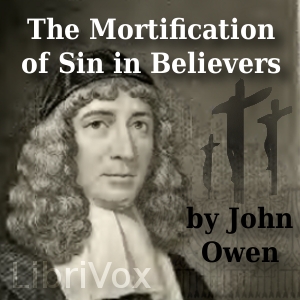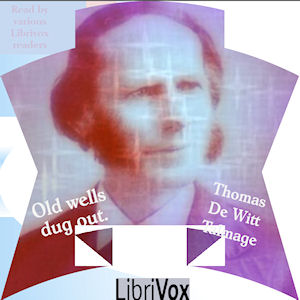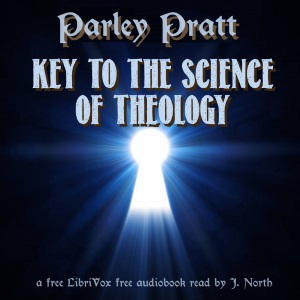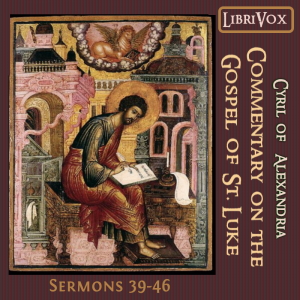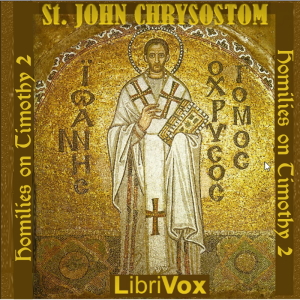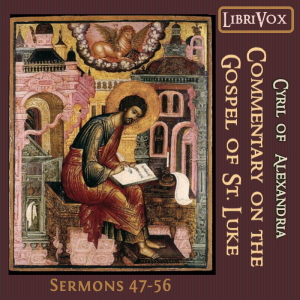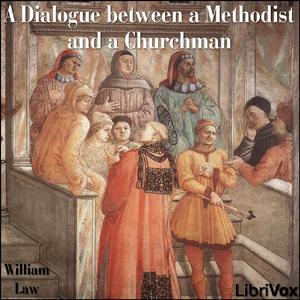
William Law (1686-1761) was an Anglican priest, Christian mystic, and one of the most prominent, popular, and controversial theological writers of his time. Law revolutionized the way in which 18th century Anglicans engaged the spiritual aspect of their faith, and his popularity rivaled that of John and Charles Wesley. Law adapted mystical practices from early church writings to the practice and doctrine of the modern British church, with the intention of equipping the Anglican layman to pursue intimacy with Christ. A Dialogue Between a Methodist and a Churchman is one of Law's purely theological works. In it, Law engages what he sees as the most dangerous doctrines of Methodism using a dialectic format. The dialogue focuses especially on the Calvinistic doctrines of predestination and absolute depravity, and is remarkable for its extrapolation of Calvinist proof texts to refute the doctrines they allegedly prove. (Summary by Kirsten Ferreri)
This recording is read as a duet by Kirsten Ferreri and David Barnes
3 episodes
Martin Luther strove to give a verse by verse exegesis of the Epistle to the Galatians in the work. The original work, written in Latin in around 1516, was much longer. This translation by Theodore Graebner strove to produce a copy of the work in a format and with wording much more applicable to the general English-speaking American public. (Summary by Timothy Perkins)
22 episodes
John Owen, in this Puritan classic, writes succinctly of the matters of the heart in dealing with sin in the life of the Christian. In a way that cuts right to the heart of the matter while leaving no room for excuses, Owen encourages the Christian to “Be killing sin or sin will be killing you.” (Summary by Stephen Escalera)
14 episodes
Originally published in 1685, Madame Guyon’s A Short and Easy Method of Prayer is considered a classic of Christian mysticism, influencing great writers and speakers such as John Wesley and Charles Spurgeon. In it, Madame Guyon carefully and briefly sets out her ‘unmethodical method’ by which any and all can commune with God at any time and under any circumstances. (Summary by Jordan)
5 episodes
Conceptions of Divine Love was written in 1577. St. Teresa wrote this with the idea of explaining certain words found in the Book of Canticles. When her confessor read the title of her work, he ordered her to immediately burn it, which, of course, she did. But one of her nuns had copied the first seven chapters, which was then published in 1612. Here, Father John Dalton has translated only four of those chapters in 1852. (Summary by Ann Boulais)
5 episodes
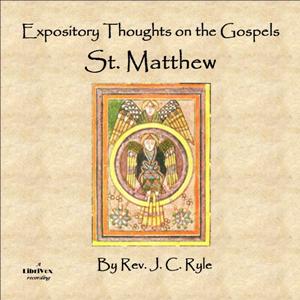
“Expository Thoughts” divides the Gospels into sections of about twelve verses each, from which J. C. Ryle selects two or three prominent points to dwell on and bring to the reader’s attention. In Ryle’s day, there were many detailed commentaries and expositions on scripture. In writing these “Expository Thoughts”, Ryle aimed to offer a resource to the laity for use in family prayers, as an aid to those who visit the sick and desire a proper book to read on such occasions, and for private devotions for those whose callings and engagements make it impossible for them to read large commentaries. Rev. Ryle offered this first volume on the Gospel of St. Matthew “with an earnest prayer, that it may tend to the promotion of pure and undefiled religion, help to extend the knowledge of Christ, and be a humble instrument in aid of the glorious work of converting and edifying immortal souls.” (Introduction by MaryAnn)
Books in this series:
Expository Thoughts on the Gospel of St. Matthew
Expository Thoughts on the Gospel of St. Mark
Expository Thoughts on the Gospel of St. Luke, Vol. 1
Expository Thoughts on the Gospel of St. Luke, Vol. 2
Expository Thoughts on the Gospel of St. John, Vol. 1Expository Thoughts on the Gospel of St. John, Vol. 2
Future recordings:
Expository Thoughts on the Gospel of St. John, Vol. 3
97 episodes

“Expository Thoughts” divides the Gospels into sections of about twelve verses each, from which J. C. Ryle selects two or three prominent points to dwell on and bring to the reader’s attention. In Ryle’s day, there were many detailed commentaries and expositions on scripture. In writing these “Expository Thoughts”, Ryle aimed to offer a resource to the laity for use in family prayers, as an aid to those who visit the sick and desire a proper book to read on such occasions, and for private devotions for those whose callings and engagements make it impossible for them to read large commentaries. This second volume of the work presents Rev. Ryle's meditations on St. Mark. As with the first volume on the Gospel of St. Matthew, Rev. Ryle offered this book “with an earnest prayer, that it may tend to the promotion of pure and undefiled religion, help to extend the knowledge of Christ, and be a humble instrument in aid of the glorious work of converting and edifying immortal souls.” (Introduction by MaryAnn)
Books in this series:
Expository Thoughts on the Gospel of St. Matthew
Expository Thoughts on the Gospel of St. Mark
Expository Thoughts on the Gospel of St. Luke, Vol. 1
Expository Thoughts on the Gospel of St. Luke, Vol. 2
Expository Thoughts on the Gospel of St. John, Vol. 1Expository Thoughts on the Gospel of St. John, Vol. 2
Future recordings:
Expository Thoughts on the Gospel of St. John, Vol. 3
77 episodes
A collection of brief biographies and the text from scripture that was significant in the life of each. It is biography and devotional Bible study expertly woven together to produce interesting and inspirational stories. (Summary by Tim Bower)
23 episodes
The title gives an accurate description of the book! It is full of old and forgotten words and phrases, Amusing at times, but addressing the problems mentioned in the chapter titles in detail. The troubles of his times are the same as today's, and Rev. Talmage does a marvelous job going through each one individually.
Summary by fiddlesticks
16 episodes
Thomas DeWitt Talmage was born in Bound Brook, New Jersey. He earned an undergraduates degree at the University of the city of New York, now known as New York University. After his graduation he studied law, but ultimately decided on the ministry. He pastored a church in Philadelphia and spoke in many other places including England and New York. This book contains 33 of his sermons all of them well worth a read or listen! They are full of encouragement and thought provoking comments. (Summary by Fiddlesticks)
33 episodes
Saint John Chrysostom's Homilies 15-25, on the Gospel of Saint Matthew, expound upon Matthew Chapters 5-7, known as The Sermon on the Mount, containing perhaps the most well-known teachings of the Lord Jesus Christ. (Summary by the reader)
14 episodes

“Expository Thoughts” divides the Gospels into sections of about twelve verses each, from which J. C. Ryle selects two or three prominent points to dwell on and bring to the reader’s attention. In Ryle’s day, there were many detailed commentaries and expositions on scripture. In writing these “Expository Thoughts”, Ryle aimed to offer a resource to the laity for use in family prayers, as an aid to those who visit the sick and desire a proper book to read on such occasions, and for private devotions for those whose callings and engagements make it impossible for them to read large commentaries. This is the first of two volumes on St. Luke. As with the previous volumes on the Gospels of St. Matthew and St. Mark, Rev. Ryle offered this book “with an earnest prayer, that it may tend to the promotion of pure and undefiled religion, help to extend the knowledge of Christ, and be a humble instrument in aid of the glorious work of converting and edifying immortal souls.” (Introduction by MaryAnn)Books in this series:
Expository Thoughts on the Gospel of St. Matthew
Expository Thoughts on the Gospel of St. Mark
Expository Thoughts on the Gospel of St. Luke, Vol. 1
Expository Thoughts on the Gospel of St. Luke, Vol. 2
Expository Thoughts on the Gospel of St. John, Vol. 1Expository Thoughts on the Gospel of St. John, Vol. 2
Future recordings:
Expository Thoughts on the Gospel of St. John, Vol. 3
68 episodes
Charles Spurgeon was a British Particular Baptist preacher who remains highly influential among Christians of different denominations, among whom he is still known as the "Prince of Preachers". In his lifetime, Spurgeon preached to around 10,000,000 people, often up to 10 times each week at different places. He was the pastor of the congregation of the New Park Street Chapel (later the Metropolitan Tabernacle) in London for 38 years.
Spurgeon was a prolific author of many types of works. His accessible commentaries on the Psalms are a combination of meditation and teaching and are appropriate for anyone wanting to understand these familiar poems on a deeper level. In this third volume, LibriVox volunteers bring you reflections on Psalms 53 to Psalm 78. (Summary modified from Wikipedia by MaryAnn)
30 episodes

“Expository Thoughts” divides the Gospels into sections of about twelve verses each, from which J. C. Ryle selects two or three prominent points to dwell on and bring to the reader’s attention. In Ryle’s day, there were many detailed commentaries and expositions on scripture. In writing these “Expository Thoughts”, Ryle aimed to offer a resource to the laity for use in family prayers, as an aid to those who visit the sick and desire a proper book to read on such occasions, and for private devotions for those whose callings and engagements make it impossible for them to read large commentaries. This is the second of two volumes on St. Luke. As with the previous volumes on the Gospels of St. Matthew and St. Mark, Rev. Ryle offered this book “with an earnest prayer, that it may tend to the promotion of pure and undefiled religion, help to extend the knowledge of Christ, and be a humble instrument in aid of the glorious work of converting and edifying immortal souls.” (Introduction by MaryAnn)
Books in this series:
Expository Thoughts on the Gospel of St. Matthew
Expository Thoughts on the Gospel of St. Mark
Expository Thoughts on the Gospel of St. Luke, Vol. 1
Expository Thoughts on the Gospel of St. Luke, Vol. 2
Expository Thoughts on the Gospel of St. John, Vol. 1Expository Thoughts on the Gospel of St. John, Vol. 2
Future recordings:
Expository Thoughts on the Gospel of St. John, Vol. 3
77 episodes
Robert G. Ingersoll was an extremely popular humanist orator in the late nineteenth century, and he wrote Mistakes of Moses after many bootlegged versions of his speeches had been published and circulated. In Mistakes of Moses, through a close, literal reading of the Pentateuch, he challenges biblical stories using science, logic and morality. (Summary by Margaret)
13 episodes
This book is a testimony of how powerful prayer is, how God answers every prayer, even if it is not just how we want it answered. Rosalind Goforth was a missionary to China with her husband and children. She had many, many opportunities to prove God's faithfulness and he never failed her if she was willing to trust him and put her every problem and difficulty in his hands. Her life is a wonderful testimony of what prayer can do! Summary by fiddlesticks
11 episodes
From September 12, 1884 through November 6, 1885, C.F.W. Walther delivered a series of 39 Friday evening lectures to his students at Concordia Seminary in St. Louis, Missouri. Unlike his doctrinal lectures during the school day, these lectures were intimate and informal. By them he intended not only to educate but to form pastors into seesorgers (healers of the soul). These lectures were first published in 1895 and have become renoun for their depth, sensitivity and insightfulness into the human heart. For well over a hundred years, generations of pastors have read and marveled at this classic presentation of Law and Gospel. - Summary by Jonathan Lange
40 episodes

We can never allow the great objective facts of Christianity, and their attendant doctrines, to sink low on our horizon; but we must give equal prominence to the demands of Christ for a righteousness which shall exceed that of the Scribes and Pharisees, and a perfection which shall resemble that of God. We have no right to be content with saying "Lord, Lord;" we must do the things which He says. Of course, the right kind of obedience is impossible, apart from the Cross and the Spirit. We must be reconciled before we can become obedient children; we must be filled with the Spirit before "the fragrance of Christ" can be manifested through us in every place. The Sermon on the Mount must be read in the transfiguring light which shines backwards from the later events in our Lord's life. When, however, this is borne in mind, each sentence of that marvelous discourse glistens with celestial radiance, and rings with the music of the Gospel. In such a spirit let us address ourselves to the study of the "Directory of the Devout Life," as it is contained in Matt. v., vi., and vii. (from the Preface)F. B. Meyer was a Baptist preacher and a friend and contemporary of D. L. Moody.
21 episodes
"The present Volume aims to embody, in a concise and somewhat original manner and style, a general view of the Science of Theology, as gathered from revelation, history, prophecy, reason and analogy. If the Work proves an introductory key to some of the first principles of the divine science of which it treats; if it serves to open the eyes of any of his fellowmen, on the facts of the past, the present, and the future; if it leads to investigation and inquiry, and calls public attention to the greater and more particular truths which have been, or are about to be, revealed as a standard by which to unite the people of all nations and of all religions upon the rock, the sure foundation of divine, eternal, uncreated, infinite and exhaustless Truth, it will have accomplished the end aimed at by THE AUTHOR." (Summary from preface)
18 episodes

I send forth the volume now in the reader's hands, with much diffidence, and a very deep sense of responsibility. It is a peculiarly serious undertaking to attempt a Commentary on the Gospel of St. John. This "Commentary" is so extensive that it occupies far more space than the "Expository Thoughts," and is, I must honestly confess, the principal part of the work. To some it may appear far too long and full. But the circumstances of the times are mu justification. We live in a day of abounding vagueness and indistinctness on doctrinal subjects in religion. Now, if ever, it is the duty of all advocates of clear, well-defined, sharply-cut theology, to supply proof that their views are thoroughly borne out by Scripture. I have endeavoured to do so in this Commentary. I hold that the Gospel of St. John, rightly interpreted, is the best and simplest answer to those who profess to admire a vague and indistinct Christianity. (From the Preface)
Books in this series:
Expository Thoughts on the Gospel of St. Matthew
Expository Thoughts on the Gospel of St. Mark
Expository Thoughts on the Gospel of St. Luke, Vol. 1
Expository Thoughts on the Gospel of St. Luke, Vol. 2Expository Thoughts on the Gospel of St. John, Vol. 1Expository Thoughts on the Gospel of St. John, Vol. 2
Future recordings:
Expository Thoughts on the Gospel of St. John, Vol. 3
34 episodes

After a long struggle against liberal tendencies in the Church of England and an unsuccessful attempt to establish the position of Anglicanism as a branch of historical Christianity whose doctrines could be proven to be identical with those of the primitive Church, John Henry Newman came to the painful realization that he could no longer remain a member of the Anglican Church. Increasingly drawn to Catholicism, he was nevertheless repulsed by the idea that the Roman Church, while preserving many ancient doctrines, had contaminated the faith by mixing into it its own invented traditions. Or could it be that these "new" doctrines were truly already present from the beginning, having only become more explicit and better understood with the passage of the centuries? "So, I determined to write an essay on Doctrinal Development; and then, if, at the end of it, my convictions in favour of the Roman Church were not weaker, to make up my mind to seek admission into her fold" (Newman, Apologia Pro Vita Sua). - Summary by ekortright
23 episodes
Cyril was a scholarly archbishop and a prolific writer. In the early years of his active life in the Church he wrote several exegetical documents. Among these were: Commentaries on the Old Testament, Thesaurus, Discourse Against Arians, Commentary on St. John's Gospel, and Dialogues on the Trinity. In 429 as the Christological controversies increased, the output of his writings was so extensive that his opponents could not match it. His writings and his theology have remained central to the tradition of the Fathers and to all Orthodox to this day. (from Wikipedia)Book I of Commentary on St John's Gospel covers John 1:1-28.
13 episodes
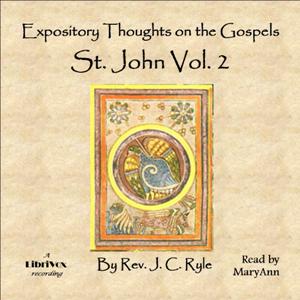
The fourteen years which have "passed over" me since I first began writing on the Gospels, I humbly hope have not been thrown away. They have been to me years of many trials, and I may add of much work, much reading, much reflection, and not a little prayer. At the end of these fourteen years, I feel more than ever convinced that what are called "Evangelical" views of Christian truth are thoroughly Scriptural views, and will bear the test of any fair investigation. The longer I live the more firmly I am persuaded that no system of divinity is so entirely in harmony with the Bible, as the system which rightly or wrongly is called "Evangelical." I now send forth this volume with an earnest prayer that God may bless it and make it useful. Ignorance of Scripture, I feel more than ever, is the curse of these latter days. Men read many books, and yet neglect "the one Book." If I can help to make the Bible more plain and interesting to any man's soul, I shall be abundantly content. (From the Preface)
Books in this series:
Expository Thoughts on the Gospel of St. Matthew
Expository Thoughts on the Gospel of St. Mark
Expository Thoughts on the Gospel of St. Luke, Vol. 1
Expository Thoughts on the Gospel of St. Luke, Vol. 2Expository Thoughts on the Gospel of St. John, Vol. 1Expository Thoughts on the Gospel of St. John, Vol. 2
Future recordings:
Expository Thoughts on the Gospel of St. John, Vol. 3
30 episodes
God has made prayer possible to us through Jesus. We can pray prevailingly only as we respond to the truths which create the possibility. The sphere of prayer includes the coming of the Kingdom of God and the provision of all the need of the saints. Thus all these constitute an integral part of the subject of the practice of prayer. Prayer is only possible to the revealed Father through the mediating Son by the inspiring Spirit. Prayer is only a prevailing power as, in the life, the child of God is loyal to His Kingship, satisfied with His provision, conformed to His likeness. Moreover, it can only be operative within the sphere revealed in the pattern of prayer. (G. Campbell Morgan)
7 episodes
Book 2 of Commentary on St John's Gospel covers John 1:29 - 5:34. (Summary by the reader)
17 episodes

Before one can correctly understand the work of the Holy Spirit, he must first of all know the Spirit Himself. A frequent source of error and fanaticism about the work of the Holy Spirit is the attempt to study and understand His work without first of all coming to know Him as a Person.It is of the highest importance from the standpoint of worship that we decide whether the Holy Spirit is a Divine Person, worthy to receive our adoration, our faith, our love, and our entire surrender to Himself, or whether it is simply an influence emanating from God or a power or an illumination that God imparts to us. If the Holy Spirit is a person, and a Divine Person, and we do not know Him as such, then we are robbing a Divine Being of the worship and the faith and the love and the surrender to Himself which are His due.It is also of the highest importance from the practical standpoint that we decide whether the Holy Spirit is merely some mysterious and wonderful power that we in our weakness and ignorance are somehow to get hold of and use, or whether the Holy Spirit is a real Person, infinitely holy, infinitely wise, infinitely mighty and infinitely tender who is to get hold of and use us. If we think of the Holy Spirit as so many do as merely a power or influence, our constant thought will be, “How can I get more of the Holy Spirit,” but if we think of Him in the Biblical way as a Divine Person, our thought will rather be, “How can the Holy Spirit have more of me?” (R. A. Torrey)
23 episodes
Book 3 of Commentary on St John's Gospel covers John 5:35- 6:37, as well as a look at the prophecy contained in Deut. 18:15-19. (Summary by the reader)
9 episodes
Book 4 of Commentary on St John's Gospel covers John 6:38 - 7:24.
12 episodes

We were having a great many accessions to our church. While many of these came by letter form other churches, many of them were new converts and had had practically no systematic instruction in the fundamental truths of the Christina faith, so we announced a series of sermons on The Fundamental Doctrines of the Christian Faith. There was immediately a large increase in the attendance at the services where these addresses were given, and this increase has kept up until on the last Lord's Day we had much the largest attendance we have ever had, excepting Easter Sunday. Many have testified to the blessing received form these sermons, and there has been a great demand that the sermons be printed for general circulation. It is hoped that this volume will be useful to other pastors in suggesting lines of teaching in their regular pastoral work, and also that it may be used widely by pastors and others for circulation among Christians. We live in a day in which many of our church members are all at sea as to what they believe on the fundamental doctrines of the Christian faith. These sermons have already helped many through their delivery. It is hoped they will reach and help far more in the printed form. (R. A. Torrey)
16 episodes
Book 5 of Commentary on St John's Gospel covers John 7:25 - 8:43. However, St Cyril was working with a New Testament manuscript which did not include what we now refer to as John 7:53 - 8:11. (The Reader)
13 episodes
Book 6 of Commentary on St John's Gospel covers John 8:44 - 10:17. (Summary by the reader)
12 episodes
This recording, of the fragments which are extant of Book 7, of Commentary on St John's Gospel covers John 10:18 - 12:2. (Summary by the reader)
5 episodes
This recording, of the fragments which are extant of Book 8, of Commentary on St John's Gospel covers John 12:3 - 12:48. (Summary by the reader)
3 episodes
Book 9 of Commentary on St John's Gospel covers John 12:49 - 14:20. - Summary by The Reader
14 episodes
Book 10 of Commentary on St John's Gospel covers John 14:21 - 16:13 - Summary by The Reader
12 episodes
De doctrina Christiana, On Christian Doctrine, is a famous treatise by Augustine of Hippo, consisting of four books that describe how to interpret and teach the Scriptures. The first three books, published in 397, set three tasks for Christian teachers and preachers: to discover the truth in the contents of the Scriptures, to teach the truth from the Scriptures, and to defend scriptural truth when it was attacked. It is believed that the last part of book three and the totality of book four were added much later, in 426. The fourth book is especially quoted for being the first treatment of the relation between Christianity and Ancient Rhetoric. Summary by Leni.
25 episodes
Book 11 of Commentary on St John's Gospel covers John 16:14 - 18:23. - Summary by the Reader
13 episodes
Book 12 of Commentary on St John's Gospel covers John 18:24-21:25. (Summary by the Reader)
11 episodes
This book is subtitled “Being Plain Statements on Some of the Weightier Matters of Christianity". The main title comes from the writings the old testament prophet Jeremiah, who refers to the old paths where the good way is, which if people walk in it they will find rest for their souls (Jer 6 v6). Bishop Ryle wrote this book at a time when many in the church were forsaking the old paths of evangelical Christianity in favour of liberal ideas. In Ryle’s day the old doctrines held by the apostolic Christians and reformers had started to be sneered at in certain quarters as being old-fashioned and worn out, and that something more modern was needed. Ryle held that the “old paths” were the best ones, and wrote “The longer I live the more I am convinced that the world needs no new Gospel, as some profess to think. I am thoroughly persuaded that the world needs nothing but bold, full, unflinching teaching of the 'old paths'.” (Summary by Christopher Smith)
64 episodes
Sermons 1-11 cover the Gospel of St Luke 1:1 - 3:23. - Summary by the Reader
4 episodes
While Isaac Newton is most known today for his research in physics, during his own life he was also well-known for his religious scholarship. Engaging in intensive research on Christian history, theology, and the Bible, Newton cared deeply about understanding his faith. Among Newton's writings are those on prophecies described in the Bible. Here, he analyzes the last book of the New Testament - Revelation AKA the Apocalypse of St. John - in order to gain an understanding of the world's end times. He seems especially interested in tracking how post-Jesus Roman history compares with the events described in Revelation. Observations Upon the Apocalypse of St. John was posthumously published in 1733, as part of Newton's larger work on Bible prophecy. (Summary by Adam Bielka)
4 episodes
This encyclical letter of Pope Pius IX was promulgated in 1864 and issued with the attached Syllabus of Errors. The document was dispatched to all the bishops of the Catholic world “in order that these same bishops may have before their eyes all the errors and pernicious doctrines which he [Pius IX] has reprobated and condemned.” The Syllabus is a catalogue of eighty propositions, which the pope condemned as erroneous, and which are considered to form the basis of the heresy of Modernism, which has been anathematized by a number of succeeding pontiffs. - Summary by Algy Pug
2 episodes
Sermons 12-25 cover the Gospel of St Luke 4:1 - 6:17. - Summary by the Reader
5 episodes
Sermons 27 through 38 cover the Gospel of St Luke 6:20 - 7:28. - Summary by the Reader
5 episodes
John Chrysostom was the Archbishop of Constantinople and perhaps one of the most famous preachers of the Eastern world. He would come to be known as Chrysostom which means means "golden-mouthed" in Greek. In this series of sermons he expounds upon St. Paul's letter to Titus.
6 episodes
Timothy was one of the disciples of the Apostle Paul, who had a deep affection for him, writing, "You know the proof of him, that as a son with a father, he has served with me in the Gospel." Philippians 2:22 Also to the Corinthians he writes: "I have sent unto you Timothy, who is my beloved son, and faithful in the Lord. In this set of homilies St. John Chrysostom (the "golden-mouthed" one), the Archbishop of Constantinople and one of the most famous preachers of the Eastern world, expounds upon Paul's first letter to Timothy.
18 episodes
Sermons 39 - 46 cover the Gospel According to Saint Luke 7:31 - 8:56. - Summary by the Reader
8 episodes
As regards the plan of the Epistle, it has been often asserted till lately that it was supposed to be but fragmentary, a series of aphorisms. Augustine, however, without formally announcing a plan as discovered by him in the Epistle, not only frequently affirms in his exposition that charity or love is the Apostle’s main theme, but so conducts the discussion, gathering his arguments and illustrations around this central thought, as to render it evident that in his view the purpose and plan of the Apostle is to set forth love in its essence and its scope, and that he intends to make this thought dominant in every part. - Summary by Philip Schaff
10 episodes
St. John Chrysostom (the golden-mouthed), the most famous preacher of his age turned his attention to 2 Timothy, giving a total of 10 sermons this letter by Paul to his beloved Timothy who he had appointed as an arch-bishop. This epistles is one of three that are called "pastoral" because they concern the conduct of church leaders. It is considered to be one of the last letters he wrote before his death in Rome. Summary by ancientchristian.
10 episodes
Sermons 47 through 56 cover the Gospel According to Saint Luke 9:1-56. - Summary by the Reader
10 episodes


